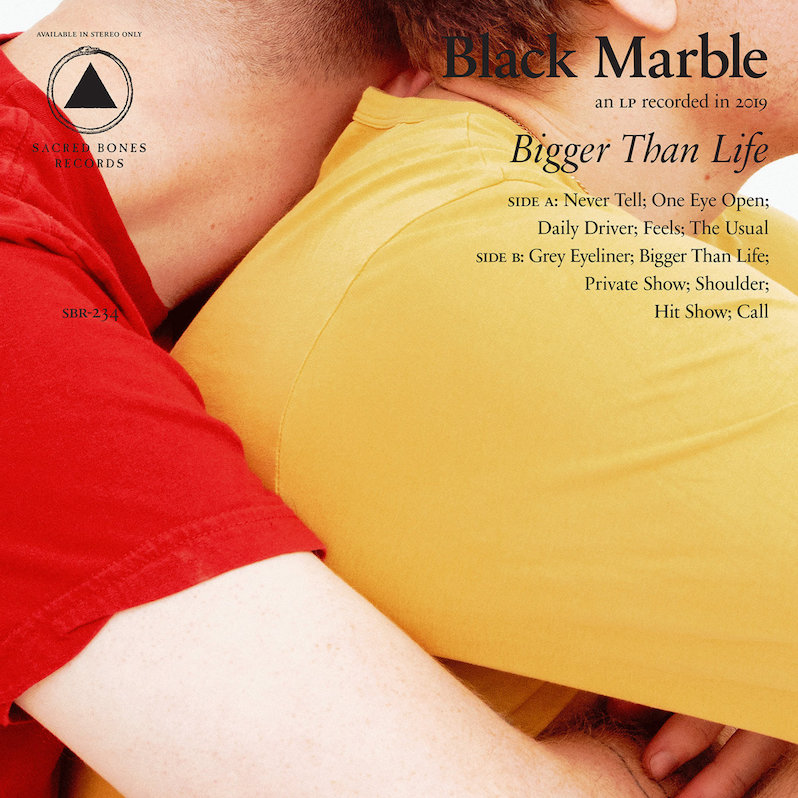Black Marble : Bigger Than Life

The roots of coldwave may date back to Kraftwerk but the real innovations on the style came with the post-punk innovations of the late ’70s and the synth-driven dream pop derivatives of the ’80s, that gorgeous goth sheen that seemed to fill every crack the nascent forerunners of the style had when dabbling in this darker corner. Nowadays, the formula for good cold wave is pretty simple: take one part early New Order, before they ditched any semblance of their time as Joy Division, add in just a splash of Kraftwerk inhumanity and Cure-lite prog/psychedelia, and make sure to don your best Ian Curtis impression when on the vocals. Lo-fi production is generally better; too much gloss and you wind up a synth pop while touching up the reverb without keeping the production gritty leaves you in dream pop or ethereal wave world, all great and related genres but not quite the thing we’re looking for.
Black Marble has only a few records to their (or, more accurately, his) name, but the eye has always been on the ball with this group, helmed by Chris Stewart. Debut EP Weight Against The Door balanced the gothic tendencies toward despondency and grayscale melancholia with great songwriting, the kind that burrows into your ear and compels you to dance even if you have your head hung toward the floor. The following LP A Different Arrangement was better, perhaps even still the project’s best; it not only had uniformly better songs, but the emotionally scattered interior was perfectly matched by a well-designed cover image of television static, giving the entire record that same kind of self-mythologizing aesthetic coherency of records like Dark Side of the Moon or Joy Division’s Closer but for the coldwave crowd. Fittingly, the follow-up It’s Immaterial came a number of years later and changed the color in a subtle but substantial way, tilting the previous intense dourness and pained longing of nostalgia present in previous songs into a kind of dreamy wistful desire we might more closely associate with dream pop than pure coldwave.
Bigger Than Life, without surprise, continues this trend. The tipoff is in several places: one, the cover is more resolutely colorful and vibrant than any so far; two, that title, miles away from the implied suicidal imagery of their debut EP. This subtle change, one that came as the group went from a duo to a solo act, was one well-presaged in the work and pop songcraft having been well established. In ways the Cure comparison bears out here; if It’s Immaterial signaled the shift from goth to brighter pop The Cure saw when they released The Top, then Bigger Than Life would be Kiss Me Kiss Me Kiss Me, pushing the directness of pop to become very nearly its central component. But Black Marble hold back from this total capitulation to synth pop, choosing not to go full CHVRCHES or Alvvays on us, at least not quite. But still, the project now feels closer to Beach House than Cold Cave.
A sense of melancholy still pervades the material, but one measured out against an equal kind of gothic joy, like dancing when you are terminally ill or looking back on pleasant memories as the things that gave them to you are finally permanently going away. This type of headspace for music to inhabit can quickly produce overly whiny or self-obsessed songs, but Black Marble are keen to prickle the lyrics with small novelistic details, little gestures that make songs less universal by text and thereby feel more earned, more real, and via that realness become universal again. It’s the same songwriting trick that figures like Bruce Springsteen have used for decades, managing to conjure that rumbling and yearning inner darkness that roils inside the bright-eyed and outwardly hopeful. It’s a delicate balance, one Black Marble manage to nail with a keen ear for bass tones we might associate with goth rock married against bright and round synths we might attribute to pop, with vocals that seem to sit perfectly between the two spaces, evoking both but choosing neither.
The effect is a more emotionally mature and torn record, one that captures well the similar kind of psychic confusion of middle age, where the yearnings of youth haven’t dissipated and if anything feel further away, while the material conditions of the sufferer have objectively improved. There is this sense within the songs on Bigger Than Life that the things sought for in youth never came, or that if they came they didn’t feel the way we hoped, and reckoning with that gap that still remains as friends come by less often and life is better but we don’t feel any better. This is miles away from the early material of this group, which accurately captured the bleaker sense of darkness that those in their late teens and early twenties feel looking down the barrel of a life that will feel this way. This is another lesson of The Cure, or even a group like Nine Inch Nails, that Black Marble seems to have learned well; it is overly simple to imagine these motivating forces for dark and dour art in our early lives resolve themselves with nothing left for us to complain about as much as they organically change shape, leave us with scar tissue from some old psychic wound that leads us to act or yearn in a way that makes no material sense given present conditions. Wisely, the songs seek not to resolve these tensions but to evoke them, balancing the questions of hope and doubt of the future with an equal nostalgia and doubt of the joys we felt in so-called simpler times.
Similar Albums:
 Drab Majesty – Modern Mirror
Drab Majesty – Modern Mirror
 The Soft Moon – Deeper
The Soft Moon – Deeper
 Lust for Youth – Compassion
Lust for Youth – Compassion
Langdon Hickman is listening to progressive rock and death metal. He currently resides in Virginia with his partner and their two pets.

